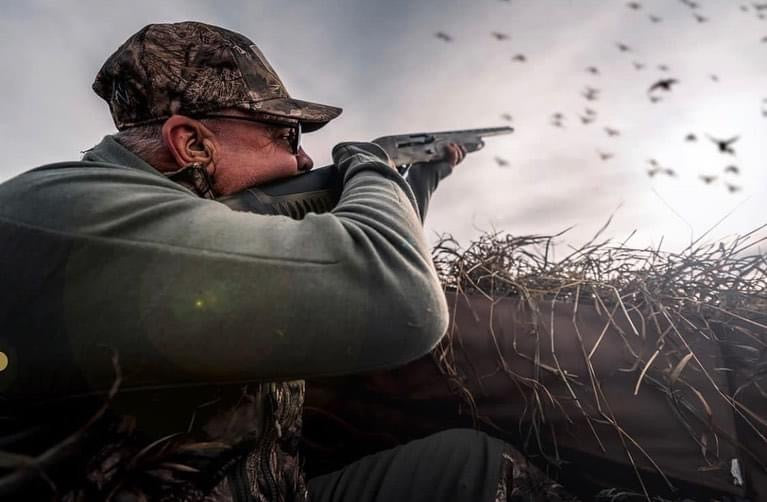Hearing Protection for Hunting | Upland and Waterfowl

Why Should You Use Hearing Protection for Hunting?
You likely already know many elderly relatives or friends who need hearing aids to keep up with daily conversations. Without hearing aids, it can be a very frustrating and lonely experience for them. But did you know that losing your sense of hearing can actually increase your risk of getting dementia or Alzheimer’s disease too? We all probably accept on some level that there will be hearing loss as you age. But shooting firearms without hearing protection can rapidly speed up that process for younger hunters. In fact, a single exposure to one very loud noise can do permanent damage to your ears. Assuming you don’t want hearing aids in your 40s or 50s, here are some benefits of wearing hearing protection for hunting, specifically upland and waterfowl hunting.
Hearing Protection for Upland Hunting
Upland hunting is a great way to explore the outdoors and get a true mixed bag of wild game for the dinner table. From pheasants to grouse to quail (and the occasional rabbit or squirrel thrown in), upland hunting offers many different opportunities. However, those opportunities come with risks. Most upland hunts will require you to take numerous shots with a shotgun for each outing since the birds or small game animals often flush and you need to take a running or flying shot. Now if you’re pretty handy with a shotgun, you may need to take fewer shots than the average sportsman. But it’s safe to assume you’ll shoot at least half a dozen times. Each shot fired without hearing protection for hunting means more damage to your ears.
Benefits for Upland Hunting
Obviously, the biggest benefit of hearing protection for hunting upland birds and animals is protecting your ears. Each shotgun round can do permanent, irreversible damage to your hearing. And ruining your ears isn’t a very good reward for a meal on the table. But many hunters avoid traditional forms of hearing protection because they interfere with the hunt itself. Using our products is a lot more comfortable over a day of hunting than wearing large, bulky earmuffs. Over a certain noise threshold (e.g., a gunshot), they will instantaneously block the sound coming in to protect your ears.
Another benefit of our products actually goes in the opposite direction, which is hearing enhancement. Oftentimes with upland hunting, it’s important to hear a pheasant cackle, a grouse flush, or a rabbit take off running. That split second of warning can be enough to swing your shotgun in time and connect with the animal you’re pursuing. If you wear foam earplug or earmuff hearing protection for hunting, it will block that sound completely. So while your hearing will be protected, you may not hear the animals flush from cover and then you won’t get a good lead on them before they’re gone. Our Specialized Target Optimization (STO) technology helps you detect animal noises and pinpoint your dog’s eCollar beeps faster, while still protecting your ears from the shotgun rounds. Our Wingshooter AlphaShield and Wingshooter CustomShield products help you while practicing at the shooting range or while out upland hunting. The CustomShield version is custom molded to fit your specific ear canals for the best possible fit.
Hearing Protection for Waterfowl Hunting
Duck hunting or goose hunting is a great group hunting activity for friends or family members. You can catch up with each other and even share snacks while you wait for the birds to approach. Not to mention, sitting in a duck blind can be one of the most relaxing and enjoyable ways to spend your time each fall. But there are two main risks with waterfowl hunting when it comes to hearing preservation. One, repeatedly shooting a 12 gauge shotgun with bigger shells and heavier shot (sometimes in a more enclosed blind space and with others doing the same thing) means the sounds are amplified even more and can do much more damage to your ears. You’re also very likely to shoot numerous times throughout a given hunt, further damaging your ears with each shot. Second, waterfowl hunting often involves a lot of very loud calling in close proximity to others. Almost nobody thinks of duck calling as a dangerous activity, but calling can be as loud as 120 decibels (dB), which is far over a safe exposure level considering you might be calling on and off for hours each hunt. You simply need hearing protection for hunting ducks or geese.
Benefits for Waterfowl Hunting
It’s probably clear to you by now why hearing protection is important for waterfowl hunters. Spending hours with your buddies calling to and shooting at ducks or geese might be a lot of fun, but it can sure wreak havoc on your ears. You should use hearing protection for hunting any time you go, but if you love duck hunting and go out several times a season, you should seriously consider investing in a quality system that will keep your ears safe for the long-term. Just imagine one day going hunting and not being able to hear a flock of geese honking in the distance or never noticing those whistling wings buzzing overhead. It would be a downright shame.
In terms of hearing enhancement, TETRA hearing devices can do a lot more for waterfowl hunters. Wearing traditional hearing protection devices (e.g., earmuffs or foam plugs) would prevent you from hearing those distant honks or the sound of whistling wings from a quickly approaching teal. But when you wear our hearing devices, you can amplify those sounds while still protecting your ears from the loud calling sequences or gunshots. Using our Waterfowl CustomShield or Waterfowl AlphaShield devices will optimize your hearing to key in on the critical sounds you need to hear: distant waterfowl calls, whistling wings, and the whispers of your hunting partners. So with one investment, you keep your ears safe for years to come and can experience a new level of waterfowl hunting with amplified hearing.
Hearing protection for hunting upland birds or waterfowl shouldn’t be negotiable anymore. Let’s move past any stigma or stubborn pride you might be holding onto, and admit that keeping your sense of hearing should be everyone’s priority while hunting.
- Tags: You Heard It First
0 comments




